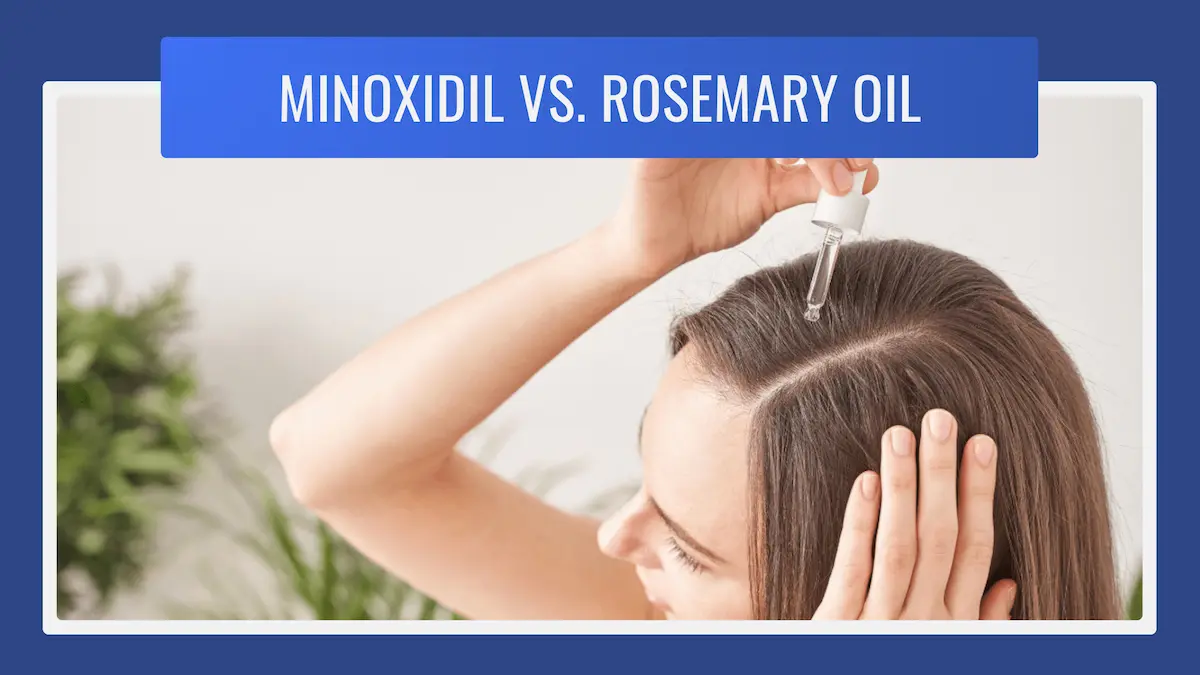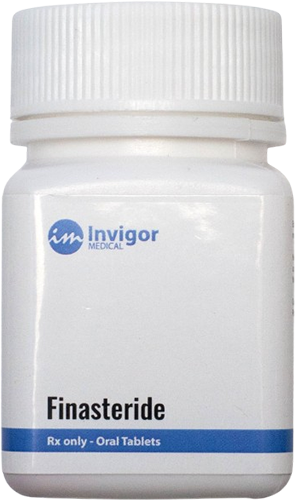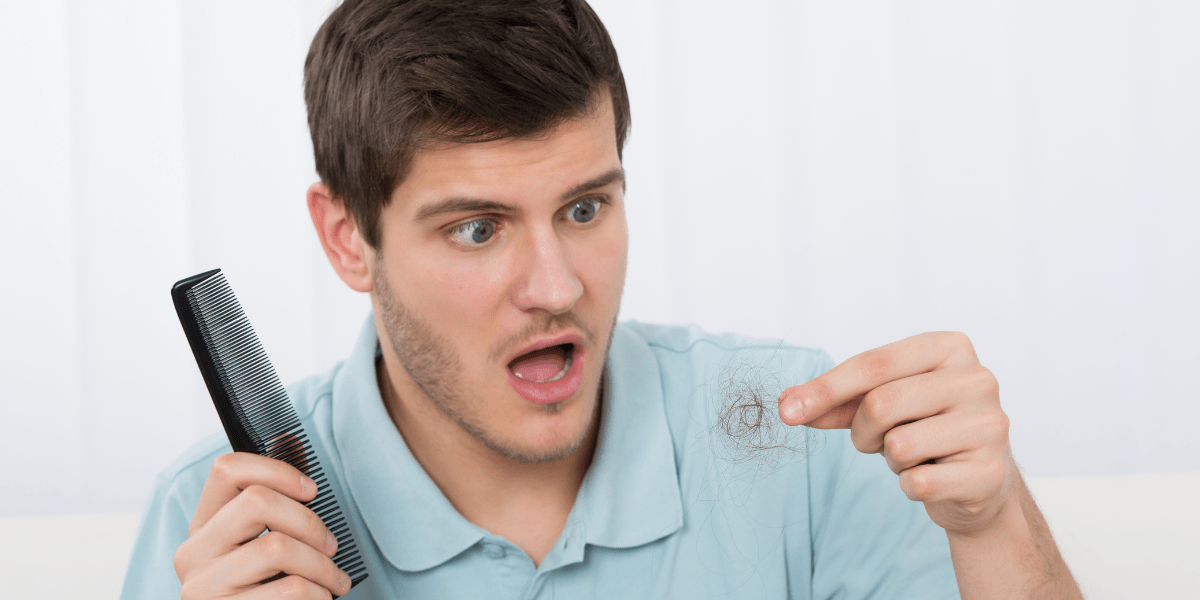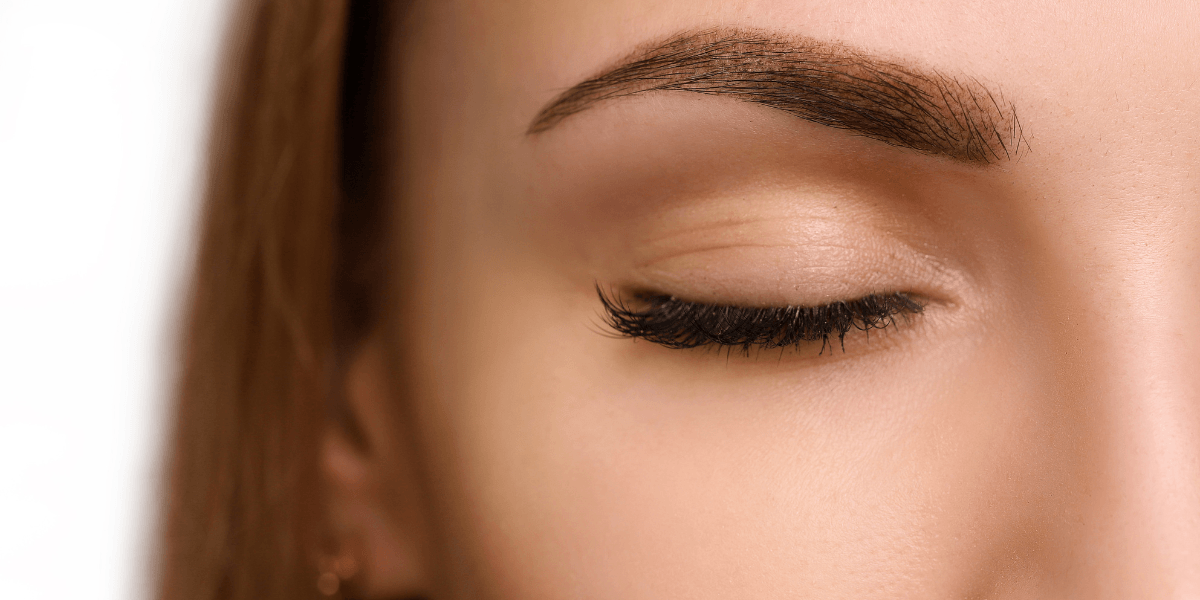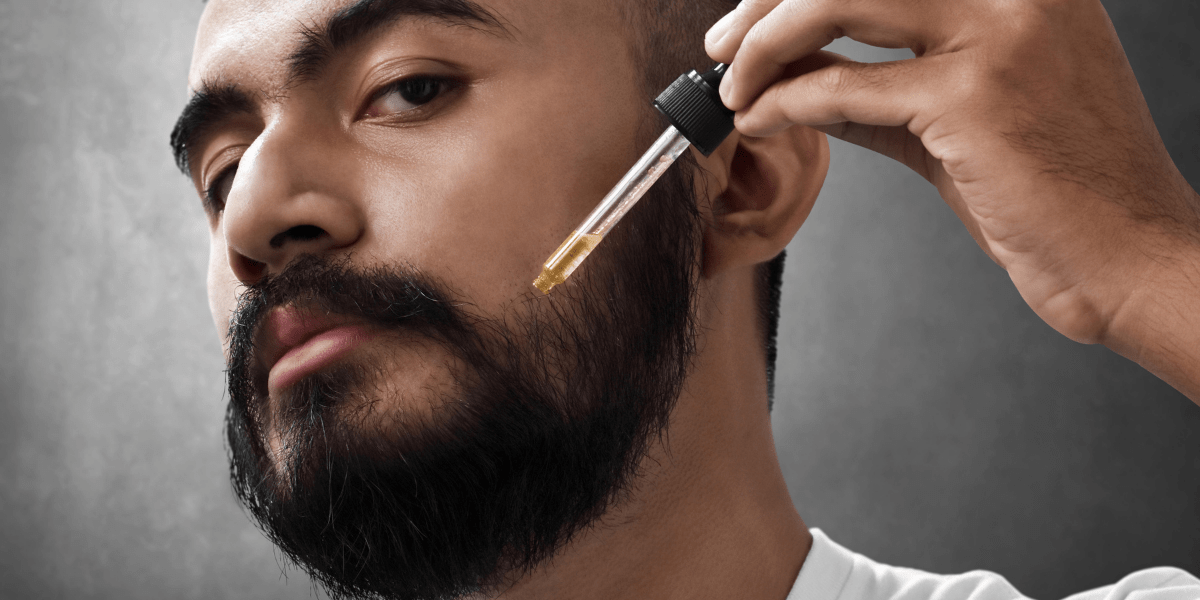If you’re looking for hair loss treatment, you’ve probably come across two popular contenders: minoxidil (the tried-and-true medical approach) and rosemary oil (nature’s aromatic answer).
Both have properties that may promote hair growth, but which one actually delivers?
Let’s dive into the science to find out.
Start your hair regrowth regimen today
Table of Contents
Growing Hair: Minoxidil vs Rosemary Oil
A 2015 study compared minoxidil and rosemary to determine their hair regeneration properties.
Researchers conducted what many consider the gold standard study comparing these two hair growing compounds.
The Minoxidil vs Rosemary Oil Study
Dr. Yunes Panahi and his team designed a randomized comparative trial that pitted rosemary oil directly against minoxidil 2%. They recruited 100 men with androgenetic alopecia and followed them for six months.
The study, published in Skinmed journal, randomly assigned participants to two groups: 50 men used rosemary oil daily, while the other 50 applied minoxidil 2% to their scalps.

How They Did It
Every three months, participants returned to the clinic for professional microphotographic assessments, where they took pictures of hair follicles.
The team counted individual hairs and tracked changes from baseline through month three and month six. They also monitored side effects.
The Results
At the three-month mark, neither group showed significant changes in hair count.
But by month six, both groups experienced significant increases in hair count compared to their starting point.
Ultimately, researchers found no significant difference between rosemary oil and minoxidil 2% in terms of hair count improvement.
Essentially, the natural botanical performed just as well as the medication. However, symptoms varied: participants using minoxidil experienced significantly more scalp itching at both assessment points.

Which is Better?
When it comes to choosing between these two options, several factors tip the scales in different directions.
Minoxidil’s Scientific Credibility
Minoxidil has decades of research backing its effectiveness. Clinical trials demonstrate that 60% of men experienced increased hair coverage after 48 weeks of minoxidil use.
The medication has undergone rigorous testing and earned FDA approval for male pattern baldness in 1988. This regulatory stamp gives minoxidil a level of credibility that takes years to achieve. However, FDA approval does not extend to compounded minoxidil.
Rosemary Oil’s Natural Appeal
For those who prefer the botanical route, rosemary oil offers an appealing alternative. The 2015 study showed it matched minoxidil 2%’s effectiveness while causing fewer side effects.
It’s the perfect choice for people who simply prefer natural solutions.
Application Differences Matter
Rosemary oil requires dilution with carrier oils before application to prevent skin irritation. You can’t just put it on your scalp straight from the bottle.
Most experts recommend a 2% dilution, mixing about two drops of rosemary oil per teaspoon of carrier oil.
Minoxidil, on the other hand, comes ready to use in standardized concentrations. Plus, minoxidil can be taken orally as an alternative to topical application.
Recent meta-analysis shows that 35% of patients experienced significant symptom improvement with oral minoxidil, giving people another option if they don’t want to deal with topical treatments.
Get help deciding between oral or topical minoxidil.

Can You Use Both?
There’s no scientific evidence suggesting that combining minoxidil and rosemary oil is unsafe. These treatments work through different mechanisms, so they might actually complement each other.
However, timing matters. If you’re using oral minoxidil, pairing it with rosemary oil for scalp treatment makes more sense than combining rosemary oil with topical minoxidil.
Oil-based treatments may interfere with topical minoxidil absorption, potentially reducing its effectiveness.
Smart Combination Strategy:
- Monitor for increased scalp sensitivity
- Apply treatments at different times to avoid interference
- Use oral minoxidil with rosemary oil scalp treatments
- Allow proper absorption time between applications

How Minoxidil Works
Despite being available for decades, the exact mechanism by which minoxidil promotes hair growth is not fully understood, but researchers have identified several key pathways.
The Science Behind the Solution
Minoxidil works primarily as a vasodilator, improving blood circulation to hair follicles. Think of it as opening the highways for nutrient delivery to your hair.
The medication stimulates ATP-sensitive potassium channels, which triggers a cascade of beneficial effects.
Key mechanisms include:
- Prolonging the anagen (growth) phase of hair follicles
- Increasing the production of vascular endothelial growth factor (VEGF) by six times
- Stimulating cell proliferation in hair follicle cells
- Enhancing blood vessel formation around hair follicles
Side Effects
Like any medication, minoxidil comes with potential side effects. Common side effects of topical minoxidil include scalp irritation, itching, contact dermatitis, and unwanted facial hair growth.
Oral minoxidil carries additional risks including fluid retention, fast heartbeat, dizziness, and potential cardiovascular effects.
A recent meta-analysis found that oral minoxidil was linked with significantly more adverse events compared to topical minoxidil.
Clinical Evidence That Counts
The numbers speak for themselves. Numerous studies have shown minoxidil’s potential for regrowing hair or reducing hair loss. In a Japanese study, men using 5% minoxidil daily showed a 50% increase in hair density.
Consult with a doctor about your options.

Other Prescription Options
Finasteride: The DHT Blocker
While minoxidil works on blood flow, finasteride takes a different approach. Finasteride works by inhibiting Type II 5α-reductase, the enzyme that converts testosterone to dihydrotestosterone (DHT). DHT is the primary hormone responsible for male pattern baldness, making finasteride’s mechanism highly targeted.
The effectiveness is impressive. Clinical studies suggest that finasteride reduces hair loss in approximately 80% of men who use it.
Documented photographs showed improvement in hair growth in 48% of finasteride recipients at 1 year and 66% at 2 years.
However, finasteride carries potential sexual side effects, including erectile dysfunction and decreased libido, occurring in approximately 3.8% of users.
Start with this guide.
Rosemary Oil and Hair Growth
Mother Nature has been in the hair care business long before pharmaceuticals entered the scene. Rosemary oil brings several mechanisms to the table that support hair growth.
How Rosemary Works Its Magic
Rosemary oil contains bioactive compounds including carnosic acid, rosmarinic acid, and various terpenes that contribute to its hair-stimulating properties. The key mechanisms include enhanced blood circulation to the scalp, antioxidant protection, and anti-inflammatory effects.
Primary mechanisms include:
- Enhanced blood circulation to the scalp, delivering nutrients and oxygen to hair follicles
- Antioxidant protection from compounds like rosmarinic acid and carnosic acid
- Anti-inflammatory effects that maintain a healthy scalp environment
- Potential DHT inhibition, with research suggesting rosemary oil may help block DHT activity
Clinical Evidence Beyond the Main Study
A 1998 study of 86 patients with alopecia areata found that aromatherapy using rosemary, thyme, lavender, and cedarwood was significantly more effective than placebo. 44% of the treatment group showed improved hair growth compared to 15% of controls.
Animal studies provide additional support. Research in mice demonstrated that herbal hair lotion containing rosemary extract showed significant hair growth-promoting activity compared to both control and 2% minoxidil-treated animals.
Antioxidant Powerhouse Properties
Rosemary oil isn’t just about hair growth – it’s a comprehensive scalp health treatment. Analysis of rosemary extracts identifies over 33 individual phytochemical compounds, with polyphenols (anti-inflammatory and antioxidant compounds) like rosmarinic acid and abietane diterpenes like carnosic acid serving as principal active ingredients.
These compounds provide:
- Antimicrobial properties that help maintain scalp health
- UV protection for hair and scalp
- Neuroprotective effects that may help restore nerve function around hair follicles
Other Natural Hair Growth Options
Biotin
Despite its popularity, biotin’s reputation exceeds its scientific evidence. There have been no studies demonstrating biotin supplementation to be beneficial for hair growth in healthy individuals. A systematic review found only three studies meeting criteria for biotin efficacy, and the highest quality study found no difference between biotin and placebo groups for hair growth.
The reality check: biotin only helps if you’re actually deficient. All documented cases of biotin improving hair growth involved patients with underlying pathology or biotin deficiency. For healthy individuals, there is a lack of sufficient evidence for supplementation.
Collagen
Collagen supplementation shows more promise than biotin. A recent clinical trial demonstrated that hydrolyzed collagen supplementation produced a 27.6% increase in total hair count compared to placebo after 12 weeks.
Your hair journey is unique to you. Though both rosemary oil and minoxidil offer similar benefits, the difference lies with you, your body, and your preferences.
Consult with a doctor
